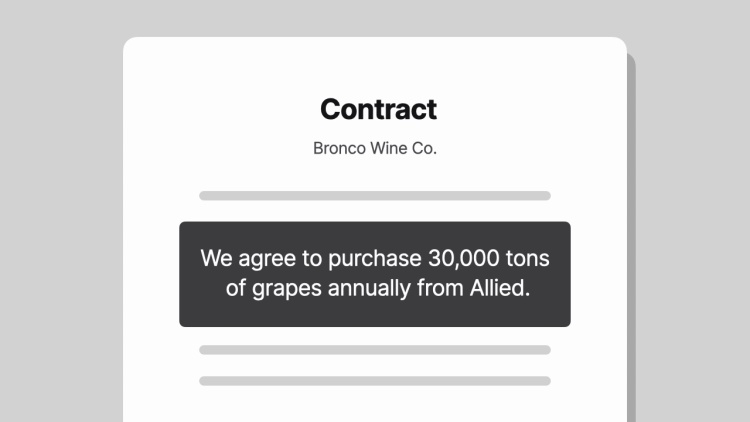Allied Grape Growers v. Bronco Wine Company
California Court of Appeal
203 Cal. App. 3d 432 (1988)
- Written by Mike Begovic, JD
Facts
Bronco Wine Company (Bronco) (defendant) was engaged in the business of crushing grapes and selling them to wine distributors. Allied Grape Growers (Allied) (plaintiff) was a cooperative corporation comprising grape growers in the business of supplying grapes for the purpose of wine production. In 1981 Bronco agreed to purchase 30,000 tons of grapes per year from Allied for use in bulk wines. In 1982 Bronco breached the contract by not accepting grapes or paying lower prices for the grapes by downgrading them under its three-tiered quality system. Allied alleged that the quality system was arbitrary and carried out to maximize profits. Bronco ultimately paid an average of $103 per ton. Allied alleged that its grapes met contract standards and that it was entitled to $150 per ton, commensurate with the contract. In 1983, despite Allied’s best efforts, Bronco repudiated the contract. After failing to find another buyer, Allied decided to form a subsidiary corporation, ISC, to purchase the grapes. According to ISC, the market value for its grapes was $100 per ton. The value to ISC for the grapes was $70 per ton. The $30 per ton loss was split between the growers and ISC, resulting in a purchase price of $85 per ton. Allied only sought damages based on the $15 per ton loss to ISC, not the $30 shared loss to ISC and the growers. A jury awarded Allied $2.65 million for Bronco’s 1982 breach of contract and $744,658 for its 1983 breach of contract. On appeal, Bronco contended that Allied’s resale to its own subsidiary was both commercially impossible and commercially unreasonable under California Uniform Commercial Code § 2706.
Rule of Law
Issue
Holding and Reasoning (Ballantyne, J.)
What to do next…
Here's why 905,000 law students have relied on our case briefs:
- Written by law professors and practitioners, not other law students. 47,100 briefs, keyed to 995 casebooks. Top-notch customer support.
- The right amount of information, includes the facts, issues, rule of law, holding and reasoning, and any concurrences and dissents.
- Access in your classes, works on your mobile and tablet. Massive library of related video lessons and high quality multiple-choice questions.
- Easy to use, uniform format for every case brief. Written in plain English, not in legalese. Our briefs summarize and simplify; they don’t just repeat the court’s language.





